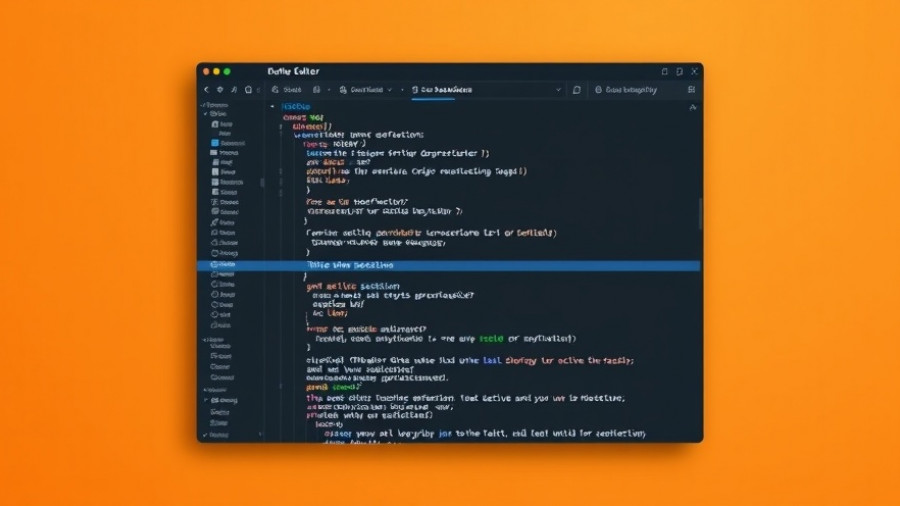
Revolutionizing Code with Claude on the Web
On October 20, 2025, Anthropic launched the browser version of its coding assistant, Claude Code, innovatively transforming how developers interact with AI tools. Previously limited to command-line interfaces, developers can now access Claude Code directly through their web browser or mobile devices, symbolizing a significant leap towards making AI more accessible to a broader range of users.
From Command Line to Cloud: Breaking Barriers
Historically, effective use of coding assistants required familiarity with command-line operations, which alienated less experienced developers. However, by introducing web and mobile access, Anthropic lowers this entry barrier substantially. If a user can navigate a web browser, they can now utilize Claude Code, enabling a more diverse audience to experience the benefits of AI-assisted coding.
This shift is more than just convenience; it's a strategic move to enhance productivity and flexibility. Developers can initiate coding tasks on their mobile devices and manage them in real-time, thus allowing for multitasking and greater adaptability in environments where traditional coding may be constrained by hardware or physical space.
Enhanced Functionality: Parallel Processing Made Easy
One of the standout features of Claude Code is its ability to run multiple coding tasks simultaneously. This parallel execution model allows developers to handle various problems in isolated environments, freeing them from the bottleneck of sequential task management. By spinning up multiple instances of Claude Code, engineers can break down complex projects into manageable parts and check results as tasks complete. This scalable approach resonates with modern development workflows that prioritize efficiency and responsiveness.
The Competitive Landscape: Following Close Behind
Anthropic’s Claude Code isn’t entering a void; it joins a competitive landscape dominated by OpenAI's Codex, Microsoft’s GitHub Copilot, and newer entrants like Cursor. All these platforms push similar motivations—enhancing coding speed and productivity through AI. OpenAI's Codex launched just five months earlier, highlighting a race within the AI coding space.
Despite the fierce competition, Claude Code is already making waves. It reportedly contributes over $500 million in annual revenue, and its user base has expanded significantly since its broader launch. Anthropic claims that 90% of its codebase is crafted using Claude Code itself, showcasing its effectiveness and reliability.
The Developer Experience: Adoption vs. Satisfaction
The journey towards adoption, however, faces mixed responses. A recent DORA report emphasized that while a staggering 90% of developers are now using AI tools, satisfaction levels are on the decline, dropping from 70% to 60%. This discrepancy reveals a significant gap, indicating that while developers recognize the utility of these tools, they express concerns regarding their usability. Striking the right balance between functionality and user experience will be essential as AI tools continue to evolve.
In a cluttered tech environment, Claude Code aims to differentiate itself by prioritizing user-friendliness and agility, keeping pace with developers’ changing needs.
Security and Usability: The Importance of Trust
With cloud-based services, concerns about security and data integrity often arise. Anthropic maintains that Claude Code operates in an isolated environment with robust security measures in place, ensuring user interactions and code integrity. Enterprise users particularly value customization options, allowing them to determine what external domains Claude can access—an invaluable feature for organizations focused on preserving proprietary information.
Looking Ahead: The Future of Coding with AI
As AI tools become integrated into everyday workflows, the coding landscape is shifting. Developer roles will likely evolve from manual code writing to managing AI assistants—allowing them to oversee complex projects efficiently. Innovations such as those introduced in Claude Code can revolutionize how tasks are executed in the tech industry.
While it's clear that AI coding tools are still refining their effectiveness, the trend points toward increasing adoption and eventual satisfaction as developers grow accustomed to these advanced solutions. As such, it’s crucial to stay informed about emerging technologies that may dictate the future of software development.
Take Action: Embrace the Future of AI in Development
For developers eager to elevate their coding experience, exploring tools like Claude Code can represent a turning point in workflow efficiency and productivity. With the promise of new features and improvements on the horizon, engaging with these AI tools now may set the stage for greater success in the future.
 Add Row
Add Row  Add
Add 




Write A Comment